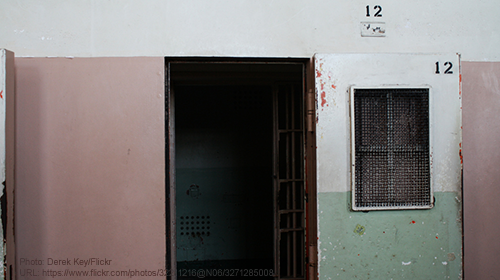
Every time they throw my brother into solitary, he loses contact visits. When we visit, he's behind glass, or we can only see him via video. We can't hug him. He can't hold his new baby niece.
My brother, Kofi M. Ajabu, has been imprisoned by the Indiana Department of Correction for nearly 20 years. All told, we estimate that he's spent nearly 10 of those years in a solitary cell, alone for 23 hours a day.
I am a psychiatrist. I know that I could prescribe a million medicines and give countless hours of psychotherapy, but none of it will be as effective if I do not help my patients connect to other human beings.
The effects of solitary confinement are well documented. High rates of suicide, anxiety, obsessive ruminations, violent thoughts, trouble sleeping, paranoia, and hallucinations are direct results of confinement. Because of these effects, the United Nations Special Rapporteur on Torture, Juan E. Méndez, has called for an absolute ban on the use of solitary confinement lasting longer than 15 days.
Every day, I treat individuals with the same symptoms, albeit with biological and psychosocial causes other than solitary confinement. The unifying theme in each of my recommendations is reconnecting my patients to a social support system.
Our "correctional" system, whose original goal was rehabilitation, takes the opposite approach. At a time when many are at a point of greatest need, the system removes the one factor that is universally accepted as a basic psychological and physiological need: contact with other human beings. Without it, prisoners' minds deteriorate.
This last time Kofi was locked in solitary, it was because he reported that a guard formed his fingers into a gun, pointed it at him, and mimicked pulling the trigger. My brother filed a grievance, and they sent him to solitary in retaliation.
This was in April. Like far too many, my brother was subjected to extreme isolation not because it addressed some valid safety concern, but because he angered a guard. Solitary is excessively used every day in this country, rarely for defensible reasons. Sometimes it's to "protect" kids held in adult facilities – kids who should never be held among adults in the first place. Sometimes it's to "protect" people particularly prone to abuse. Sometimes it's because the facility is overcrowded, so guards pack multiple people into an isolation cell the size of a parking spot.
All of these reasons ignore the fact that solitary does its own dramatic, and sometimes irreversible, damage. It erodes people's mental health and can make them even more vulnerable to abuse. Solitary Watch estimates that more than 44,000 people are in solitary confinement in U.S. prisons, often ranging in duration from 18 months to over six years. Without systemic change, these people will suffer and languish and deteriorate.
We were lucky. Two days after we notified my brother through the prisoner mail system that Ken Falk of the ACLU of Indiana was going to review documents about his solitary confinement, Kofi was released from solitary and transferred to a medium-security facility.
It was an incredible victory for our family. But sadly, the fight is far from over. We will not stop. I am only one person, but together we can continue to fight for my brother and others who have the right to be treated humanely.
To find out more about the excessive use of solitary confinement and strategies to end it, please read the ACLU's newly updated briefing paper.
Learn more about solitary confinement and other civil liberty issues: Sign up for breaking news alerts, follow us on Twitter, and like us on Facebook.

